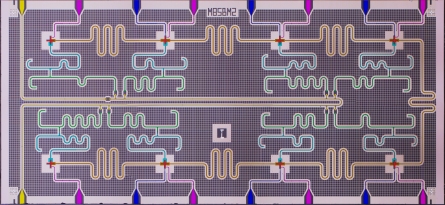
Computing
Quantum computation is among the most far-reaching and challenging goals of quantum technologies.
Quantum computation is among the most far-reaching and challenging goals of quantum technologies. Based on quantum bits that can be zero and one at the same time and instantaneous correlations across the device, a quantum computer acts as a massive parallel device with an exponentially large number of computations taking place at the same time. There already exist many algorithms that take advantage of this power and that will allow us to address problems that even the most powerful classical supercomputers would never solve.

8-Qubit superconducting quantum processor fabricated at ETH Zurich
Quantum computers using different platforms have been demonstrated over the last two decades.
Many platforms and architectures have demonstrated the basic principles of quantum computing based on solid-state systems (electron spins in semiconductors, nuclear spins in solids, Majorana zero modes) and on atomic and optical systems (nuclear spins in molecules, hyperfine and Rydberg states in atoms and photons, to name but a few).
Due to technological interest and the evident limitations of existing approaches, referred to as the “end of Moore’s Law” of computational scaling, global IT companies have been taking an increased interest in quantum computing in the last decade. Advances in quantum computer design, fault-tolerant algorithms and new fabrication technologies are now transforming this “holy-grail” technology into a realistic programme poised to surpass classical computation by ten to twenty years in some applications. With these new developments, the question companies are asking is not whether there will be a quantum computer, but who will build and profit from it. Intel, HRL Laboratories and NTT, for example, are supporting spin qubits in semiconductors; Google, IBM and Intel are investing in superconducting qubits; D-Wave is producing a superconducting quantum annealer; Microsoft is betting on topological quantum bits; and Lockheed Martin and INFINEON are supporting research with trapped ions and their interface with photons.
With world-leading research in quantum computing located in Europe, many IT companies have chosen academic partners in Europe for their R&D efforts. Realising quantum computing capability in Europe on a decade-long timescale will require synergy between industrial and academic partners, as well as involvement of engineers from institutes like Fraunhofer, IMEC, VTT and LETI in multidisciplinary consortia. The hardware efforts have to be complemented by the development of quantum software to obtain optimised quantum algorithms able to solve application problems of interest. Europe is a leader in the development of software for classical high-performance computing applications and so is well placed to establish the emerging field of quantum software engineering, with a number of leading quantum software groups already active and interacting with hardware teams.
For more information on Quantum Computing, check out the topics below or the hand-picked educational videos in our Quantum Playlist.



